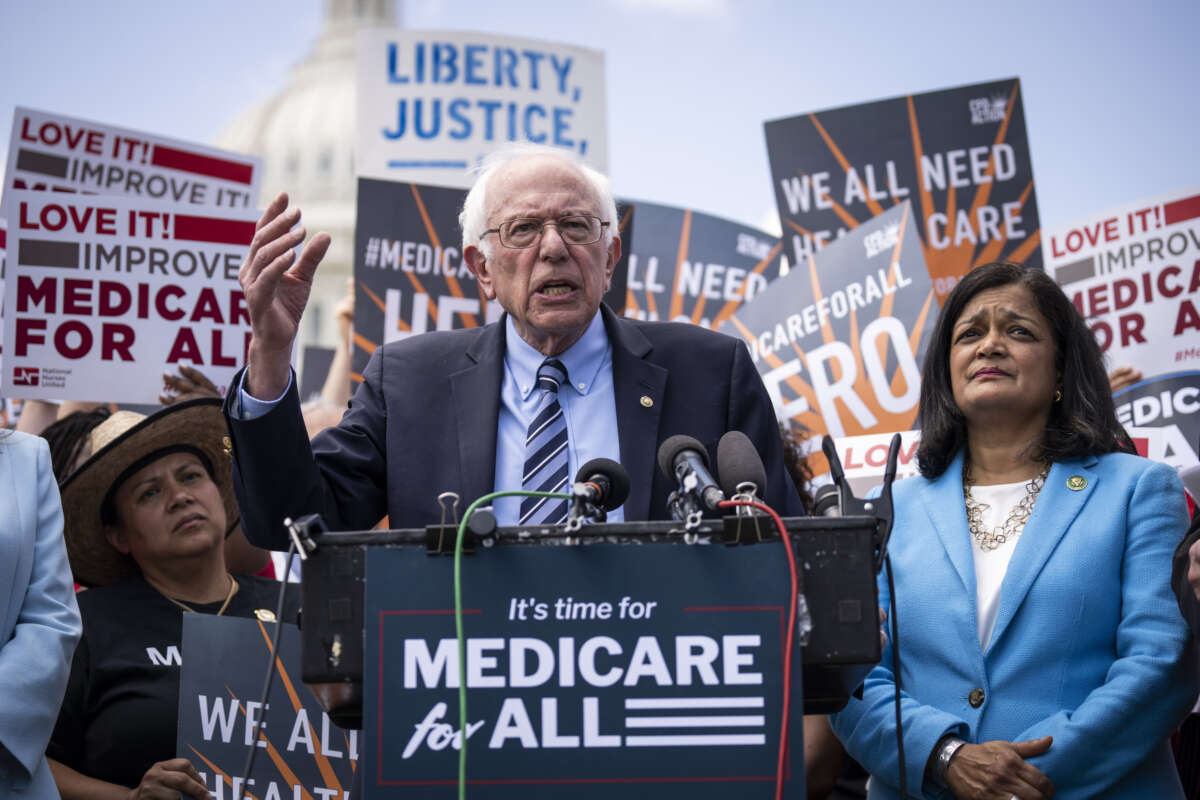Part of the Series
Fighting for Our Lives: The Movement for Medicare for All
For his first time as chair of the Senate Health, Education, Labor and Pensions (HELP) Committee, Bernie Sanders (I-Vermont) has reintroduced legislation to establish universal health care across the U.S., the only wealthy country that doesn’t guarantee health care coverage to all its citizens.
The Medicare for All Act would provide health care for all, including visits to providers of primary care, vision, dental, reproductive care, and more, without out-of-pocket expenses and insurance premiums. Prescription drugs would also be covered, and the government would be allowed to negotiate prescription drug prices with pharmaceutical companies. Because coverage would be universal, patients would no longer have to jump through hoops to sort out which providers are covered, as the concept of “in network” would, like in other countries, largely no longer exist.
In short, Medicare for All would revolutionize the U.S. health care system. It would ensure that the estimated 85 million Americans who are uninsured or underinsured could access health care without substantial costs, while other Americans would no longer have to live in fear of losing coverage if they lose their jobs.
This could save tens of thousands of lives each year, while also saving the country hundreds of billions of dollars on health care expenditures. A 2020 study published in The Lancet found that Medicare for All would save over 68,000 lives a year; additionally, research has found that between the beginning of the COVID-19 pandemic and March 2022, over 338,000 COVID deaths could have been prevented had the U.S. had universal single-payer health care.
At the same time, despite the right’s complaints that Medicare for All would be too expensive, the conservative Congressional Budget Office has found that the program would save $650 billion a year in health care costs.
“The American people understand, as I do, that health care is a human right, not a privilege,” said Sanders, who is responsible for popularizing the concept of Medicare for All, in a statement. “As we speak, there are millions of people who would like to go to a doctor but cannot afford to do so. That is an outrage. In America, your health and your longevity should not be dependent on your bank account or your stock portfolio.”
“After all the lives that we lost to this terrible pandemic, it is clearer now, perhaps more than it has ever been before, that we must act to end the international embarrassment of the United States being the only major country on earth to not guarantee health care to all,” he continued.
Fourteen senators and over 110 House members joined Sanders in introducing the bill, with the House effort led by Representatives Pramila Jayapal (D-Washington) and Debbie Dingell (D-Michigan). It has been endorsed by 197 organizations, including major unions like Service Employees International Union (SEIU), health care worker unions like National Nurses United and progressive organizations like Public Citizen.
The bill would phase the program in over the course of four years. In the first year, Medicare recipients would see an immediate improvement to their health care access with the addition of coverage to vision, dental and hearing. Over the years, the Medicare eligibility age would steadily decrease until, by year four, every U.S. resident would be eligible for Medicare, regardless of age.
The U.S. is the only wealthy country that doesn’t guarantee its residents health care coverage. As a result, the U.S. is a consistent global outlier in health metrics; a Commonwealth Fund report recently found that, despite spending far more than other Organisation for Economic Co-operation and Development (OECD) countries do on health care, the U.S. has the worst health outcomes in terms of measurements like life expectancy, infant and parental mortality and avoidable deaths.
The bill introduction comes as Sanders is waging a major push forhealth care. According to Politico, the senator is working on a $200 billion health package that would work to bolster and improve the health care system, including $130 billion for community health centers and $75 billion to boost the health care workforce and graduate medical education.
